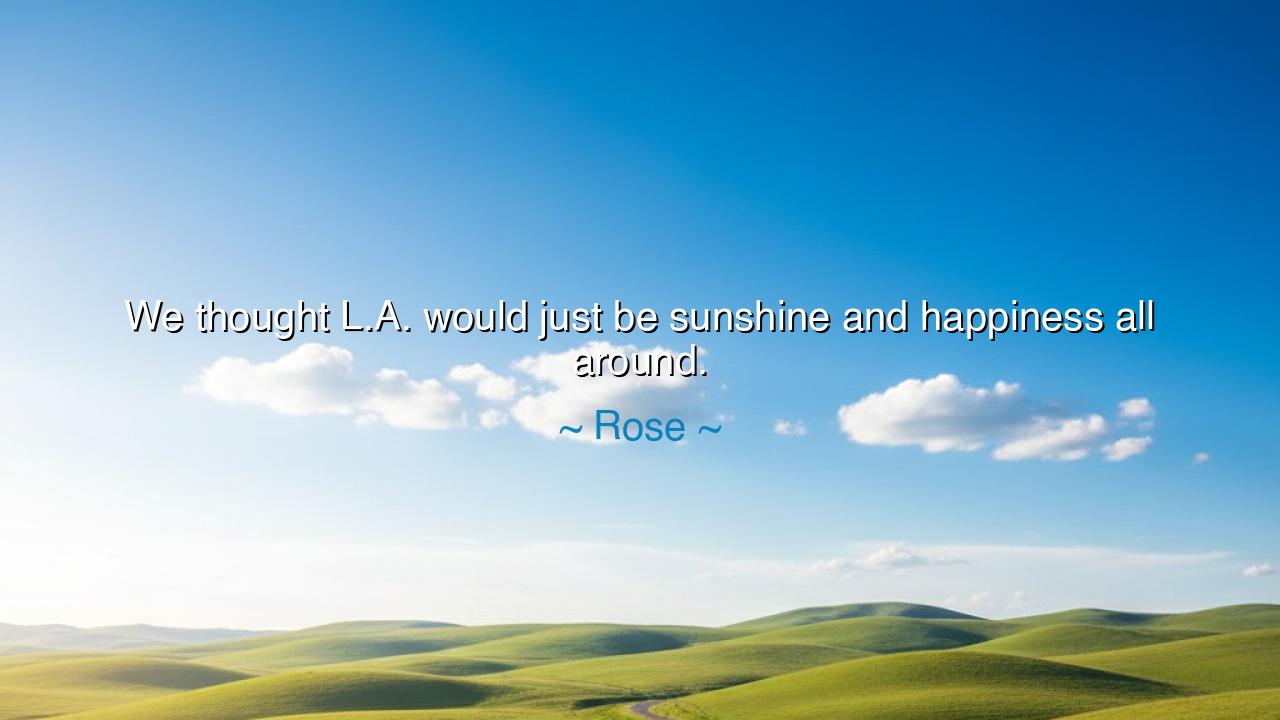
We thought L.A. would just be sunshine and happiness all around.






When Rose said, “We thought L.A. would just be sunshine and happiness all around,” she spoke not only of a city, but of a timeless human illusion—the belief that happiness lives elsewhere, that joy is waiting for us just beyond the horizon. Her words are soft in sound, yet heavy with realization. They remind us that expectation is often brighter than reality, and that no place on earth, however gilded, is free from the shadows of the human heart. Beneath the shining skies of Los Angeles, she found not endless joy, but the truth that light and sorrow dwell side by side in every land.
Los Angeles, city of dreams and illusions, has long been a symbol of promise. To many, it is a place of rebirth, a golden shore where ambition blooms like flowers in eternal summer. The young come seeking fame, beauty, and belonging. They imagine streets paved with opportunity, skies forever blue, and lives lit by constant joy. Yet, as Rose’s words suggest, reality waits patiently behind the mirage. For even in the city of angels, the human heart carries its storms. The sunshine may warm the skin, but it cannot heal the wounds that travel with us from within.
Her reflection is an echo of an ancient truth: the illusion of paradise has followed humankind through every age. When the first explorers set sail for new worlds, they imagined lands of endless bounty; when pilgrims sought holy cities, they dreamed of peace without struggle. Yet in each new place, they found the same truths that followed them from home—work, longing, loss, and the need to build happiness not from the soil, but from the soul. So too with Los Angeles, the modern Eden of light and illusion: beneath its golden skies lies the same yearning that has always haunted humankind—the longing for meaning.
There is a story that mirrors Rose’s realization: the tale of Theodor Dreiser, the early American novelist, who journeyed from poverty to the heart of urban America believing that success would bring him peace. When he finally found fame, he discovered instead a deeper emptiness. “The world,” he wrote, “is a vast machine for disappointment.” Yet Dreiser did not surrender to despair. Instead, he learned that the pursuit of meaning—not the pursuit of glamour—was the true path to fulfillment. Like Rose, he came to see that happiness cannot be found in place, but in purpose.
Rose’s quote is therefore not a lament, but a quiet awakening. It is the recognition that sunshine and happiness are not the same thing. The first is given by nature; the second must be cultivated by the spirit. One may live beneath a perfect sky and still feel lost, or dwell in shadow and still be filled with light. The great paradox of life is that joy does not come from circumstance but from understanding—understanding of oneself, of others, and of the world’s imperfect beauty.
In this way, her words become a teaching for all who dream of elsewhere. We must not mistake external brightness for inner peace. Happiness is not found in geography, but in gratitude; not in fame, but in friendship; not in sunlight, but in the way we choose to see. The wise do not flee from sorrow, nor do they chase illusions—they build contentment in the present, like a fire that warms even through the coldest night.
So, my children of wonder and restlessness, take this lesson from Rose’s reflection: do not seek a city of endless joy, for it does not exist. The sun shines and the rain falls in every place. Instead, become the source of light wherever you are. Let your happiness arise not from the weather of the world, but from the climate of your heart. Then, even in cities of shadow, you will carry your own sun—and find that the paradise you sought has always been within you.






AAdministratorAdministrator
Welcome, honored guests. Please leave a comment, we will respond soon